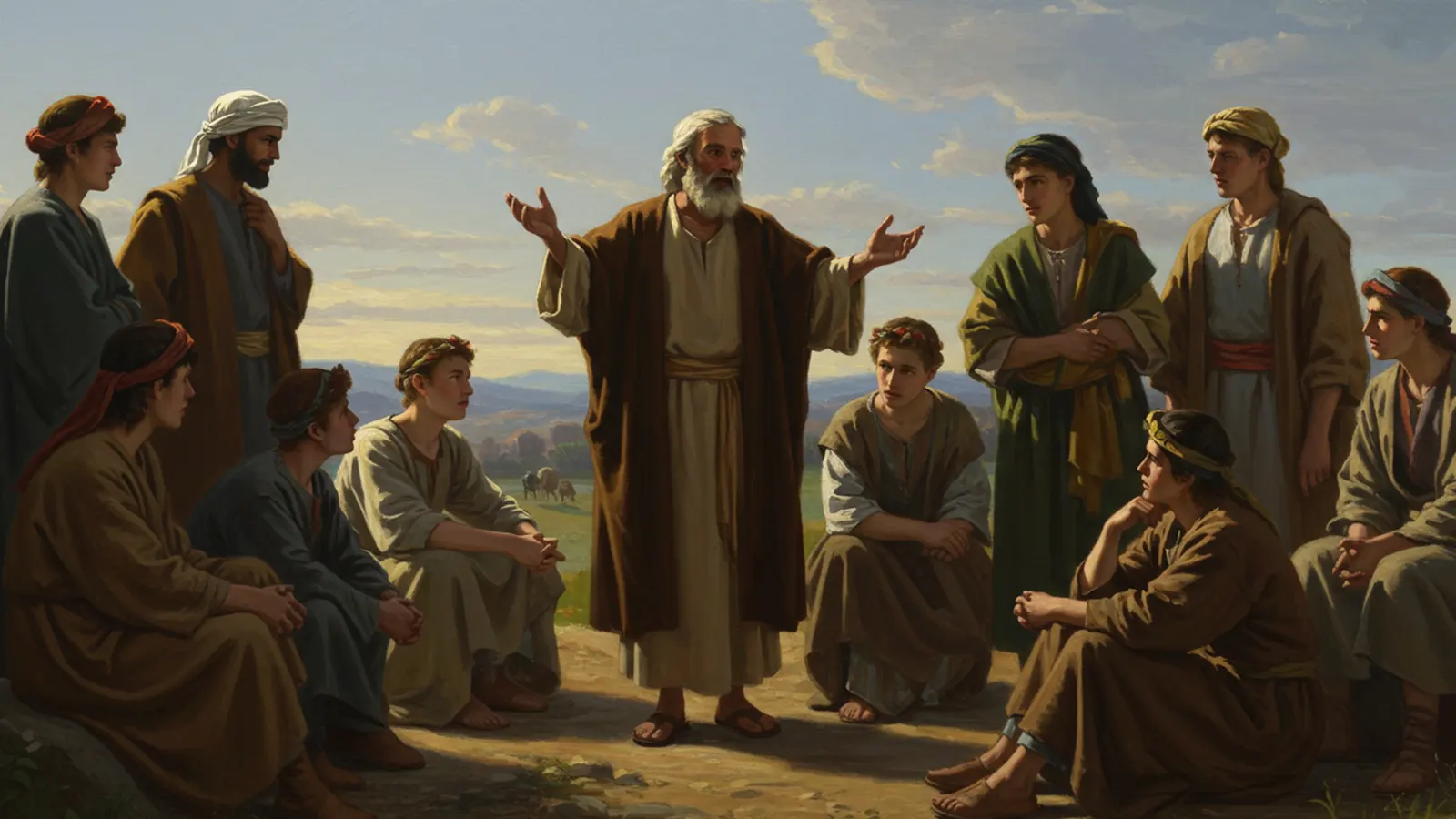The chapter of 2 Kings 4 is one of the richest and most inspiring in the Old Testament narrative. It presents a sequence of stories connected to the prophet Elisha, Elijah’s successor, where faith, obedience, and God’s intervention are manifested in situations of despair, need, and hope. As we study 2 Kings 4, we find not only historical accounts but also deep lessons that can be applied to our daily lives.
The Context of 2 Kings 4
The book of 2 Kings continues Israel’s history and shows how the prophets acted in times of spiritual crisis. Many kings turned away from God’s will, leading the people into idolatry and injustice.
In this setting, Elisha emerges as a prophet of great spiritual authority. He not only represented the voice of God but also showed compassion for the needs of the people. His miracles impacted kings and rulers, but also reached families and ordinary people.
In 2 Kings 4, this reality becomes even more evident. The text reveals that God cares both about great national events and the personal dilemmas of everyday life, showing a care that encompasses every area of life.
The Widow and the Oil
The widow’s cry
The first narrative of 2 Kings 4 introduces a desperate widow whose husband had served the Lord as a prophet. After his death, she finds herself in debt and at risk of losing her sons to slavery.
This episode shows the harsh reality of the time, but also God’s sensitivity to human suffering.
The miracle of the oil
Elisha asks the widow to gather jars borrowed from neighbors and begin filling them with the little oil she had at home. The oil multiplies until all the jars are full.
The account in 2 Kings 4 here conveys a powerful message: even the little we have can become abundant in God’s hands.

The Shunammite and Hospitality
A generous woman
Also in 2 Kings 4, we meet the Shunammite woman, described as someone of means but, above all, generous. She offers food and lodging to Elisha whenever he passed through her region.
Recognizing her kindness, the prophet wishes to repay her.
The promise of a son
Elisha prophesies that the Shunammite, who had been barren, would have a son. The miracle happens, revealing God’s faithfulness in rewarding faith and hospitality.
The Resurrection of the Shunammite’s Son
The unexpected drama
Some years later, the Shunammite’s son becomes ill and dies. In despair, she runs to Elisha. This is one of the strongest moments of 2 Kings 4, as it shows this woman’s confidence in God’s power.
The miracle of restored life
Elisha goes to the Shunammite’s house and, in an act of intercession and contact, prays over the boy, who returns to life. The chapter of 2 Kings 4 becomes a testimony to faith’s victory over death.
Death in the Pot
The need for food
In another episode of 2 Kings 4, during a time of famine, some of the prophet’s disciples cook a soup with wild herbs, but unknowingly put something poisonous in the pot.
The miracle of purification
When the danger is discovered, Elisha throws flour into the pot and, miraculously, the food becomes safe. This passage reinforces that God has power even over what seems irreversible.
The Multiplication of the Loaves
Scarcity before many
The chapter of 2 Kings 4 ends with another remarkable miracle: a man brings twenty barley loaves to Elisha, but there were a hundred people to feed.
Abundant provision
Elisha orders the food to be shared, and multiplication occurs: everyone eats and there is still some left over. This miracle points to God’s constant care and even foreshadows Jesus’ multiplication of the loaves in the Gospels.
Spiritual Lessons from 2 Kings 4
Faith amid difficulties
The chapter of 2 Kings 4 shows that faith opens doors to the supernatural. In situations of debt, scarcity, or even in the face of death, trusting in God is what transforms the impossible into reality. Faith does not eliminate problems, but connects us to divine power that changes scenarios of despair into testimonies of victory.
The value of generosity
The Shunammite woman is a living example of how generosity attracts blessings. Her act of offering hospitality to Elisha was unexpectedly rewarded, proving that those who practice kindness reap fruits beyond what they could imagine. 2 Kings 4 teaches that giving does not impoverish; on the contrary, it opens the way to God’s abundance.
The power of prayer
The resurrection of the Shunammite’s son reveals the strength of persevering prayer. 2 Kings 4 makes it clear that intercession made in faith has the power to alter even what seems irreversible. Prayer not only seeks divine help but also expresses total confidence that God is able to reverse any situation.
God cares about everyday life
The recorded miracles did not happen in palaces, but in simple homes and among ordinary families. This shows that God is neither distant nor reserved only for great historical deeds. In 2 Kings 4, He reveals Himself as a Father who cares about every detail of life—from providing food to restoring hope in times of pain.

Main Characters in 2 Kings 4
Elisha
Elisha is the spiritual protagonist of the chapter. As Elijah’s successor, he bears not only the responsibility of keeping the prophetic message alive but also of revealing God’s presence in the details of the people’s lives.
In 2 Kings 4, Elisha appears as a mediator between the divine and the human, showing that obedience, faith, and intimacy with God make the impossible possible. His miracles were not performed to exalt himself but to point to the Lord’s power and compassion.
The widow
The widow illustrates the reality of those who face pain and despair yet choose to seek help in God. She had lost her husband and was about to lose her sons to slavery.
Her decision to obey the prophet’s instructions shows that even in moments of deep anguish, practical faith opens the way to divine provision. The widow represents all who trust God when human resources offer no way out.
The Shunammite
The Shunammite woman is one of the most striking characters in 2 Kings 4. Wealthy and influential, she could have ignored the prophet, but she chose to use her generosity to bless him with hospitality. This gesture opened the door for God to perform miracles in her life.
She received a son as a reward and, years later, faced the pain of seeing him die. Her reaction was not revolt but perseverance and trust: she ran to the prophet believing that God could intervene. The Shunammite became an example of unshakable faith, showing that true trust is not shaken even in the face of death.
The disciples
Elisha’s disciples appear in situations that highlight human frailty. In one episode, while preparing food during a famine, they unknowingly put poisonous ingredients into the pot. This mistake could have been costly, but it also made room for another miracle.
They represent those who are still learning to depend on God. Their limitations show that the power was not in them but in God, and that spiritual learning is a continuous process.
The Symbolism of the Miracles in 2 Kings 4
The miracles narrated in 2 Kings 4 are not merely extraordinary events of the past. Each carries deep symbolism that reveals timeless spiritual truths.
The oil
The oil multiplied in the widow’s house symbolizes the ongoing presence and action of God’s Spirit. Just as the oil did not run out as long as there were jars available, the divine presence is not limited: the more room we give, the more He fills.
This miracle teaches that the little, when placed in God’s hands, becomes abundant. It also reminds us that faith is the vessel that allows us to experience the fullness of divine care.
Restored life
The resurrection of the Shunammite’s son points to God’s power over death. This miraculous act shows that no situation is final when the Lord intervenes.
The symbolism is clear: what seems lost can be restored. More than giving life back to a boy, the miracle reveals the hope God offers amid mourning, losses, and seemingly dead-end situations.
The multiplication of food
The episode in which Elisha multiplies the loaves symbolizes the generosity and abundance of divine provision. Even when resources seem insufficient, God is able to multiply and supply every need.
This miracle reminds us that the Lord’s goodness knows no bounds. He not only provides but makes it overflow, showing that His provision goes beyond what is necessary and reaches fullness.
Applications of 2 Kings 4 for Today
Trust God with the little
Just like the widow’s oil, small seeds of faith can produce great results.
Practice hospitality
Generosity opens doors to deep experiences with God.
Seek God’s presence in times of crisis
The Shunammite inspires us not to give up in the face of loss, but to run into God’s presence.
Connections between 2 Kings 4 and the New Testament
The miracles described in this chapter parallel those performed by Jesus. Thus, 2 Kings 4 anticipates the message of the gospel, showing that the same God who acted through Elisha continues to work in the lives of those who believe.
FAQ about 2 Kings 4
What is the central theme of 2 Kings 4?
The theme is God’s provision and intervention in different life situations, showing that He cares about both practical and spiritual details.
How many miracles are described in 2 Kings 4?
Four major miracles: the multiplied oil, the resurrection of the Shunammite’s son, the purified “death in the pot,” and the multiplication of the loaves.
Who was the Shunammite woman?
A generous woman who hosted Elisha and received as a reward the miracle of a son and, later, his resurrection.
What is the main message of the multiplied oil?
That God can turn scarcity into abundance when we place the little we have in His hands.
Why is 2 Kings 4 important?
Because it teaches that God acts in both personal and collective situations, revealing His care for every detail of human life.
LEIA TAMBÉM:
- Genesis 6: A Corrupção Humana e o Chamado de Noé
- Mateus 6:33: Buscar Primeiro o Reino de Deus
- The Chosen: Entenda a Cena de Jesus no Vale dos Ossos Secos
- Jejum de Daniel: Entendendo o Propósito – 21 Dias
NOS SIGA NO FACEBOOK